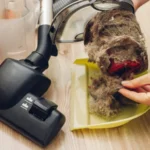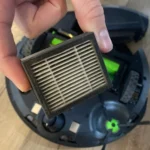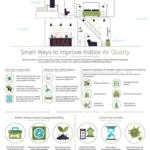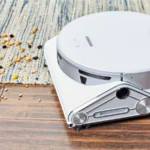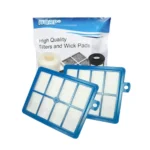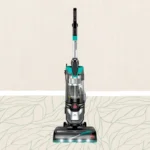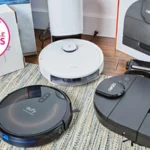Have you ever wondered how often you should change the HEPA filter in your smart vacuum cleaner? It can be confusing to know when it’s time to replace it, but don’t worry – we’ve got you covered. HEPA filters play an important role in maintaining clean indoor air, and understanding how they work and how to properly maintain them can improve the air quality in your home. In this article, we will guide you through the process of changing your smart vacuum cleaner’s HEPA filter, as well as provide tips on how to extend its lifespan. Let’s get started!
What is a HEPA filter?
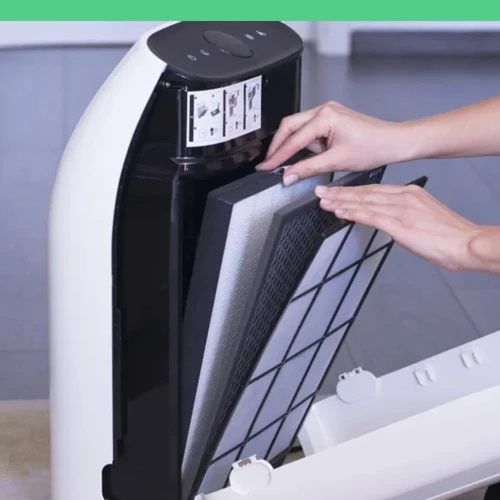
When it comes to keeping your home free of dust and allergens, a HEPA filter can be a game changer. HEPA filter stands for High-Efficiency Particulate Air filter, and it’s a type of air filter that can trap a high percentage of particles as small as 0.3 microns, which includes common allergens like pollen, pet dander, and dust mites. This makes HEPA filtration particularly useful for those with allergies or asthma. In this section, we’ll explore what exactly a HEPA filter is, how it works, and the benefits it can provide for your health and home.
What does HEPA stand for?
HEPA stands for High-Efficiency Particulate Air. It is a type of air filter that is capable of trapping tiny particles that can be harmful to human health, such as dust, pet dander, pollen, and smoke. The HEPA filter was first developed during World War II to prevent the spread of radioactive particles. Since then, it has become a widely-used technology for air purification.
HEPA filters are commonly used in vacuum cleaners, air purifiers, and other types of air filtration systems. Vacuum cleaners with HEPA filters are especially useful for people with asthma or allergies, as they can capture a large proportion of harmful particles in the air.
| Acronym | Definition |
|---|---|
| HEPA | High-Efficiency Particulate Air |
HEPA filters work by capturing particles in a dense web of fibers. As air is pulled through the filter, particles become trapped and clean air is released on the other side. One of the benefits of using a HEPA filter is that it can capture particles smaller than 1 micron, such as bacteria and viruses.
HEPA filters are also beneficial for reducing indoor air pollution. According to the Environmental Protection Agency, indoor air can be up to five times more polluted than outdoor air. Using a vacuum cleaner with a HEPA filter can help reduce the number of harmful particles in the air, making it safer and healthier to breathe.
How does a HEPA filter work?
A HEPA filter is a type of air filter that is designed to capture and remove a high percentage of particles from the air. HEPA stands for High-Efficiency Particulate Air, and these filters are constructed from a dense web of fine fibers that are randomly arranged.
The way a HEPA filter works is through a combination of three mechanisms: diffusion, interception, and impaction. Diffusion occurs when small particles are bombarded by air molecules, causing them to move erratically and eventually collide with a fiber in the filter. Interception occurs when particles follow the air stream, but come close enough to a fiber that they stick to it. Finally, impaction occurs when larger particles cannot follow the air stream around fibers and get stuck in them.
HEPA filters are designed to capture particles as small as 0.3 micrometers with an efficiency level of 99.97%. To put that into perspective, a human hair is about 50-100 micrometers in diameter. The fine fibers in the filter create a maze-like path for air to flow through, and as air passes through the filter, the particles become trapped in the fibers. This makes HEPA filters a top choice for individuals with allergies, asthma, or other respiratory problems.
Not only do HEPA filters work to remove harmful particles from the air, but they also help to ensure that the air is clean and fresh. The use of HEPA filtration in smart vacuums has been a major selling point for people with allergies and asthma, as it can help remove allergens and irritants from the home. HEPA filtration in smart vacuums has also been proven to help reduce the symptoms of allergies and asthma over time.
In addition to making the air cleaner and healthier to breathe, HEPA filters also contribute to a cleaner home. HEPA filters trap dust, dirt, and other debris that would normally be circulated back into the air during vacuuming. This results in less household dust and allergens, making cleaning less of a chore.
The benefits of using a HEPA filter in a smart vacuum cleaner are clear. These filters remove harmful particles from the air, reduce symptoms in allergy and asthma sufferers, and contribute to a cleaner home. If you’re interested in investing in a smart vacuum cleaner with a HEPA filter, it’s important to understand how often the filter needs to be replaced to ensure that it is functioning properly. To learn more about how often you should change your smart vacuum cleaner’s HEPA filter, continue reading the next section.
HEPA filtration has proven to be very effective for allergies and asthma sufferers.
What are the benefits of using a HEPA filter?
Using a HEPA filter in your smart vacuum cleaner brings a lot of benefits for your health and the environment. Here are some of the advantages of using a HEPA filter in your vacuum cleaner, which are proven by scientific studies and research.
| Benefits of using a HEPA filter in your smart vacuum cleaner |
| Removes airborne particles like dust, mold, and pollen, creating a clean indoor environment |
| Reduces the risk of allergies, asthma, and other respiratory problems |
| Traps fine particles that traditional vacuum cleaners would recirculate back into the air |
| More efficient at capturing dust and dirt, leading to a better overall cleaning performance |
| Produces cleaner air indoors which can be especially beneficial for people with allergies or other respiratory issues |
| HEPA filters have a longer lifespan than regular filters which means a longer lasting cleaning product |
| Environmental benefits because the use of HEPA filters help reduce polluting power plants and reduce emissions. |
These are just some of the benefits that a HEPA filter can offer. If you suffer from asthma, allergies, or other respiratory issues, investing in a vacuum cleaner with a HEPA filter can make a huge difference in keeping your symptoms at bay. Using a HEPA filter vacuum cleaner can have a positive effect on the people with asthma who are regularly exposed to household allergens, such as pet dander and dust mites.
Using HEPA filtration systems is also important in industrial factories, construction sites, and medical facilities that require the most indoor air quality.
If you want to know more about the benefits of using a HEPA filter, check out this detailed guide on HEPA filtration and asthma. If you already have a smart vacuum cleaner that uses a HEPA filter, you should follow the necessary maintenance tips to ensure that it is functioning efficiently. Learn more about this in our article on maintaining your smart vacuum cleaner’s HEPA filter.
How often should you change your smart vacuum cleaner’s HEPA filter?
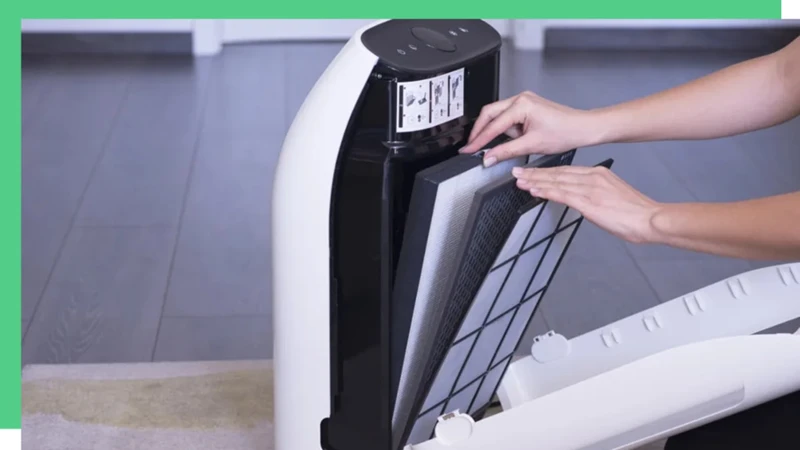
When it comes to owning a smart vacuum cleaner with a HEPA filter, many people wonder, how often should the HEPA filter be changed? Although there is no definitive answer, it’s crucial to pay attention to the signs and factors that impact the lifespan of the filter. A clean HEPA filter is essential for optimal performance, so let’s take a closer look at what you need to know.
Factors affecting the lifespan of a HEPA filter
Proper maintenance of your smart vacuum cleaner’s HEPA filter is important to ensure it works effectively throughout its lifespan. However, there are several factors that can affect the lifespan of a HEPA filter.
1. Frequency of use: One of the main factors that affects the lifespan of a HEPA filter is how often you use your smart vacuum cleaner. If you use it frequently, the filter will become clogged with dirt and debris more quickly, reducing its lifespan.
2. Type of debris: The type of debris that the HEPA filter is exposed to also affects its lifespan. If you vacuum a lot of pet hair or heavily soiled areas, the filter will become clogged more quickly and will need to be changed more often.
3. Indoor air quality: The quality of the air in your home or office also affects the lifespan of your HEPA filter. If you live in an area with high levels of pollution or experience seasonal allergies, your filter will need to be changed more frequently.
4. Filter quality: The quality of the HEPA filter itself also affects its lifespan. Cheaper, lower quality filters will need to be changed more often than higher quality, more expensive filters.
To prolong the lifespan of your HEPA filter, it’s important to take these factors into consideration and adjust your maintenance schedule accordingly. Regular cleaning and replacement of your filter when necessary is vital to ensure your smart vacuum cleaner is performing at its best. For more information on HEPA filters and vacuum cleaners, visit hepa-filter-vacuum-cleaner.
Signs that it’s time to change the HEPA filter
As a responsible smart vacuum cleaner owner, it is essential to know when to change your HEPA filter. HEPA filters are designed to capture even the smallest particles, which means they can become clogged over time. Here are some signs that it’s time to change your smart vacuum cleaner’s HEPA filter:
| Signs | What it means |
| The vacuum cleaner is losing suction. | A dirty or clogged HEPA filter can cause a decrease in suction power. |
| Allergies are getting worse. | If you or someone in your household suffers from allergies, and symptoms are worsening, it may be time to change the HEPA filter. Over time, HEPA filters can become clogged with allergens, diminishing their effectiveness. |
| The vacuum cleaner is emitting a bad odor. | If your vacuum cleaner is emitting an unpleasant odor, it may be a sign that the HEPA filter is full and needs to be replaced. |
| The HEPA filter appears dirty or discolored. | If the filter itself looks dirty, it’s probably time to replace it. A dirty filter can’t trap new particles effectively, and can actually release trapped particles back into the air. |
Keep an eye out for these signs, and don’t wait too long to change your HEPA filter. Waiting too long can not only cause your vacuum cleaner to lose effectiveness, but it can also be detrimental to the health of you and your household. In the next section, we will discuss how to change your smart vacuum cleaner’s HEPA filter.
How to change your smart vacuum cleaner’s HEPA filter
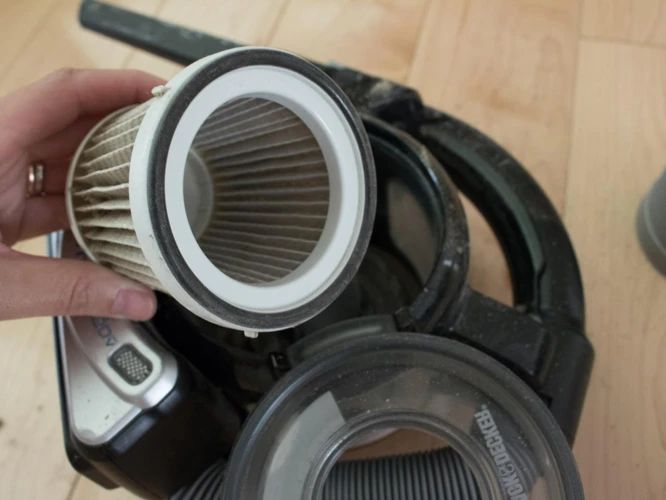
Changing the HEPA filter in your smart vacuum cleaner might feel daunting at first, but it’s actually a quick and easy process that anyone can do. By regularly replacing the filter, you’ll ensure that your vacuum is working at its best and picking up all the dust, dirt, and allergens in your home. In this section, we’ll go through the step-by-step guide on how to change your smart vacuum cleaner’s HEPA filter, so you can keep your home clean and healthy.
Step-by-step guide
If it’s time to change your smart vacuum cleaner’s HEPA filter, don’t worry! It’s a quick and easy process. Here’s a step-by-step guide to help you out:
| Step | Instructions |
|---|---|
| Step 1 | First things first, make sure your smart vacuum cleaner is turned off and unplugged to avoid any electrical mishaps. |
| Step 2 | Locate the filter compartment which is usually located near the dustbin or in the rear of the vacuum. |
| Step 3 | Open the filter compartment and remove the old HEPA filter. You may need to press a button or release a latch to do so. |
| Step 4 | Dispose of the old filter properly. HEPA filters may contain harmful particles, so make sure to follow your local disposal regulations. |
| Step 5 | Take your new HEPA filter and remove any packaging or plastic wrap that may be covering it. Check for any instructions or labels on the filter itself that may indicate which side should face the vacuum and which side should face the outside. |
| Step 6 | Insert the new HEPA filter into the filter compartment, lining up any tabs or slots that will keep it in place. |
| Step 7 | Close the filter compartment and make sure it is secure. |
| Step 8 | Turn on your smart vacuum cleaner and run a quick test to make sure the new filter is properly installed and functioning. |
Congratulations! You have successfully changed your smart vacuum cleaner’s HEPA filter. Remember to follow the manufacturer’s recommendations for filter replacement frequency to keep your vacuum working efficiently.
Tips for maintaining your smart vacuum cleaner’s HEPA filter
After investing in a high-quality smart vacuum cleaner with a HEPA filter, it’s important to ensure that you maintain it properly. With regular use, the filter can become clogged with dirt and dust, reducing its effectiveness over time. To keep your vacuum running optimally and ensure that you get the most out of your investment, here are some tips and tricks for maintaining your smart vacuum cleaner’s HEPA filter. By following these guidelines, you can extend the lifespan of your filter and improve the air quality in your home.
Regular cleaning schedule
Maintaining a regular cleaning schedule is vital in ensuring that your smart vacuum cleaner’s HEPA filter operates efficiently for a prolonged period. It is recommended that you clean the HEPA filter once every three months, but the frequency of cleaning may vary depending on usage and the environmental conditions the vacuum cleaner operates in. Here are some tips to help you develop a cleaning schedule that works for you:
| Frequency | Usage and Environmental Conditions | Cleaning Process |
|---|---|---|
| Weekly | Regular usage in a low pollution environment | Remove the HEPA filter from the vacuum cleaner and use a soft brush to gently dislodge any debris or dust.
Once finished, rinse the filter under lukewarm water and allow it to air dry. |
| Bi-Weekly | Regular usage in moderate pollutions or occasional usage in low pollutions | Follow the same process as above, but use a vacuum hose with a soft brush attachment to vacuum any loose debris from the filter before rinsing it under lukewarm water. |
| Monthly | Regular usage in high pollutions or occasional usage in moderate pollutions | Use a vacuum hose with a soft brush attachment to vacuum any loose debris from the filter.
Soak the filter in lukewarm water and a mild cleaning solution for about 15 minutes. Rinse the filter under lukewarm water and repeat the process until the water runs clear. Allow the filter to air dry before putting it back into the vacuum cleaner. |
It’s worth noting that a dirty HEPA filter can lead to reduced suction power, therefore reducing your vacuum cleaner’s effectiveness. Regular cleaning not only prolongs the life of the filter but also ensures that your vacuum cleaner continues to operate at optimal levels.
Proper storage when not in use
After investing in a high-quality HEPA filter for your smart vacuum cleaner, it’s important to ensure that it stays in good condition even when it’s not being used. Proper storage is crucial in maintaining the filter’s effectiveness and ensuring its longevity. Here are some tips to help you store your HEPA filter correctly:
| Tips for Proper Storage of HEPA Filter |
|---|
| 1. Keep it in a Cool, Dry Place Store the filter in a cool, dry place such as a closet or a shelf. Avoid storing it in a damp location, as moisture can lead to mildew and mold growth, which can damage the filter and decrease its efficiency. |
| 2. Protect it from Direct Sunlight The sun’s UV rays can break down the filter’s fibers over time, especially if it’s exposed to sunlight for extended periods. So, make sure to store the filter away from windows or any other areas where it might be exposed to direct sunlight. |
| 3. Avoid Dusty Areas When not in use, store the filter in a clean and dust-free location. Exposure to dust and dirt can clog up the filter, reducing its efficiency over time. |
| 4. Store it in a Sealed Bag Dust and dirt can accumulate on the filter even when it’s not in use. To protect it from external contaminants, store the filter in a sealed bag. This will also help prevent any accidental damage from mishandling. |
| 5. Replace the Bag When Needed If you’re storing your filter in a bag, make sure to replace the bag when it becomes dirty or damaged. A torn or worn-out bag can expose the filter to dirt and dust, rendering it useless. |
By following these simple tips, you can ensure that your smart vacuum cleaner’s HEPA filter remains in optimal condition, providing you and your loved ones with healthy and clean air every time you use your smart vacuum cleaner.
Conclusion
In conclusion, it is vital to understand the importance of regularly changing your smart vacuum cleaner’s HEPA filter. A dirty or clogged filter reduces the efficiency and effectiveness of your vacuum cleaner, leading to poor air quality and a less-than-satisfactory cleaning experience.
By following the recommended guidelines provided by the vacuum cleaner manufacturer, you can prolong the lifespan of your HEPA filter and improve the overall performance of your vacuum cleaner.
Regular cleaning and maintenance of the filter can significantly extend its lifespan, and ensure that you can enjoy the full benefits of using a HEPA filter in your vacuum cleaner. In addition, properly storing your vacuum cleaner and its accessories can help prevent dust and dirt buildup, which can further reduce the need for frequent filter changes.
Investing in a high-quality smart vacuum cleaner with a HEPA filter may seem like an added expense, but it is a worthwhile investment in your health and the cleanliness of your home. With proper care and maintenance, your smart vacuum cleaner can provide years of reliable, efficient service, and help keep your indoor air quality at its best.
So, if you want to keep your home clean and healthy, be sure to pay attention to the condition of your vacuum cleaner’s HEPA filter, and follow the recommended maintenance guidelines provided by the manufacturer. A clean filter is a happy filter, and a happy filter means a cleaner, healthier home for you and your family.
Frequently Asked Questions
What is the importance of a HEPA filter in a smart vacuum cleaner?
A HEPA filter plays a vital role in trapping tiny particles and allergens, purifying the air as vacuumed.
How long does a HEPA filter last in a smart vacuum cleaner?
The lifespan of a HEPA filter varies depending on usage, but it’s usually recommended to change every 6-12 months.
Can I wash and reuse a HEPA filter for a smart vacuum cleaner?
Some HEPA filters can be washed and reused, but it’s always best to check the manufacturer’s instructions for specific guidelines.
Can I use third-party HEPA filters in my smart vacuum cleaner?
It’s always best to use OEM HEPA filters for your smart vacuum cleaner, as third-party filters might not fit or work correctly.
What’s the difference between a standard filter and a HEPA filter in a smart vacuum cleaner?
A HEPA filter can trap microscopic particles that a standard filter can’t. It’s especially useful for people with allergies or asthma.
How often should I clean my smart vacuum cleaner’s HEPA filter?
You should aim to clean your smart vacuum cleaner’s HEPA filter once a month or more frequently if you use it daily.
What happens if I don’t change the HEPA filter on time?
The HEPA filter won’t capture nanoparticles and become clogged, making it less efficient in cleaning the air in your home.
Do all smart vacuum cleaners come with HEPA filters?
No, not all smart vacuum cleaners come with HEPA filters, but many high-end models do, so it’s essential to double-check before purchasing.
Can I run my smart vacuum cleaner without a HEPA filter?
No, HEPA filters are integral to smart vacuum cleaners’ function, which means they should always be present and replaced when necessary.
How can I tell if my smart vacuum cleaner’s HEPA filter needs to be changed?
You may notice less suction or a musty odor coming from the vacuum cleaner or see dust escaping the filter’s seal. These all indicate it’s time for a replacement.

